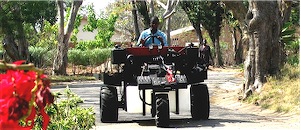In these economically troubling times in the western nations it seems no job is certain. As we watch the unemployment rate sneak up to 5%, 6%, and higher and we rightfully fret over our friends and family whose jobs may be threatened.

Imagine a country where the unemployment rate reaches above 80%, where almost no jobs were available and where there was no welfare system or any other safety net. How would people survive? The African nation of Malawi where I live is one such place. How do people survive there, you might ask. My first answer would be, “I’m not quite sure, but somehow they do.” My second thought would add, “Not too well.” The little country is terribly overpopulated with around 13 million people trying to live on a small piece of land that could comfortably accommodate about only about one-third that number. With so few jobs, most people have to live off the shrinking amount of available land, which is being divided into smaller and smaller parcels as Malawians continue to have more kids, who are forced to divide their parents’ plots in order to survive. On those little plots Malawians continue to use the age-old backbreaking method of cultivation with simple hoes. Stooping over for months of the year, they first clear their gardens, then cultivate, then plant, and continue weeding until the harvest
No wonder Malawi is listed as one of the poorest nations of the world with one of the highest mortality rates, lowest literacy levels, and so on year after year, decade after decade.
Tractor Offers Hope in Agriculture Development
Enter the V-Tractor. Tom Rich, owner of the L. T. Rich Manufacturing Company of Lebanon, Indiana has provided us, through the Malawi Project, a tool that offers hope for people to escape the grim realities described above. The V-Tractor (“V” is for Village, hence “Village Tractor’) is the most versatile instrument I have ever seen. Equipped to work with a plow, water tank, and a growing list of other applications, the tractor makes it easy to switch from one job to another in a matter of five minutes or so. The operator simply loosens some simple fasteners like bolts and cotter pins, pushes the current application aside, and just as quickly attaches the new one. Operation is even easier, a critical feature in a country where most people have never operated any kind of driven machinery. The hydraulic pedal covers every movement, including forward and backward motion, and braking. There is no need to change gears. At the demonstration that I attended, a group of Malawians who had never driven a tractor or a car or anything else for that matter, got behind the wheel and flawlessly maneuvered the tractor on the flat and with a little practice were cultivating acres of land.
An Eyewitness Marveled
The tractor moved at a good speed, it’s plow cutting through the rock-hard soil that had had several months of dry weather to harden. It made its way back and forth, softening the soil for the next
We are thankful to the Malawi Project for directing this marvelous tool our way.
Mark Thiesen
Director
Naminkango Maternity Hospital and Mission
Thondwe, Malawi
